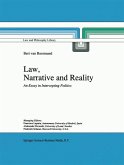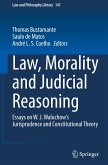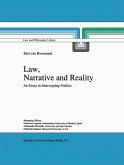- Gebundenes Buch
- Merkliste
- Auf die Merkliste
- Bewerten Bewerten
- Teilen
- Produkt teilen
- Produkterinnerung
- Produkterinnerung
Law, Psychology, and Morality: The Role of Loss Aversion systematically analyzes the complex relationships between loss aversion and the law weaving together insights from cognitive and social psychology, neuropsychology, behavioral economics, experimental legal studies, economic analysis of law, normative ethics, moral psychology, and comparative law. It discusses diverse legal issues in private and public law, national and international law, and substantive and procedural law.
Andere Kunden interessierten sich auch für
![Natural Law, Liberalism, and Morality Natural Law, Liberalism, and Morality]() Robert George (ed.)Natural Law, Liberalism, and Morality104,99 €
Robert George (ed.)Natural Law, Liberalism, and Morality104,99 €![Law, Narrative and Reality Law, Narrative and Reality]() G. C. van RoermundLaw, Narrative and Reality77,99 €
G. C. van RoermundLaw, Narrative and Reality77,99 €![Enforcing Morality Enforcing Morality]() Steven WallEnforcing Morality101,99 €
Steven WallEnforcing Morality101,99 €![Where Law and Morality Meet Where Law and Morality Meet]() Matthew H. KramerWhere Law and Morality Meet158,99 €
Matthew H. KramerWhere Law and Morality Meet158,99 €![Law, Morality and Judicial Reasoning Law, Morality and Judicial Reasoning]() Law, Morality and Judicial Reasoning127,99 €
Law, Morality and Judicial Reasoning127,99 €![Law, Narrative and Reality Law, Narrative and Reality]() G. C. van RoermundLaw, Narrative and Reality75,99 €
G. C. van RoermundLaw, Narrative and Reality75,99 €![Social Justice, Public Law, and Jurisprudence in India Social Justice, Public Law, and Jurisprudence in India]() S P SatheSocial Justice, Public Law, and Jurisprudence in India326,99 €
S P SatheSocial Justice, Public Law, and Jurisprudence in India326,99 €-
-
-
Law, Psychology, and Morality: The Role of Loss Aversion systematically analyzes the complex relationships between loss aversion and the law weaving together insights from cognitive and social psychology, neuropsychology, behavioral economics, experimental legal studies, economic analysis of law, normative ethics, moral psychology, and comparative law. It discusses diverse legal issues in private and public law, national and international law, and substantive and procedural law.
Hinweis: Dieser Artikel kann nur an eine deutsche Lieferadresse ausgeliefert werden.
Hinweis: Dieser Artikel kann nur an eine deutsche Lieferadresse ausgeliefert werden.
Produktdetails
- Produktdetails
- Verlag: Hurst & Co.
- Seitenzahl: 280
- Erscheinungstermin: 27. November 2014
- Englisch
- Abmessung: 221mm x 145mm x 48mm
- Gewicht: 748g
- ISBN-13: 9780199972050
- ISBN-10: 0199972052
- Artikelnr.: 62665286
- Herstellerkennzeichnung
- Libri GmbH
- Europaallee 1
- 36244 Bad Hersfeld
- gpsr@libri.de
- Verlag: Hurst & Co.
- Seitenzahl: 280
- Erscheinungstermin: 27. November 2014
- Englisch
- Abmessung: 221mm x 145mm x 48mm
- Gewicht: 748g
- ISBN-13: 9780199972050
- ISBN-10: 0199972052
- Artikelnr.: 62665286
- Herstellerkennzeichnung
- Libri GmbH
- Europaallee 1
- 36244 Bad Hersfeld
- gpsr@libri.de
Eyal Zamir is the Augusto Levi Professor of Commercial Law at the Hebrew University, where he served as Dean of the Faculty of Law from 2002 to 2005. He has been a visiting researcher or visiting professor at the law schools of Harvard, Yale, NYU, Georgetown, UCLA, and Zurich. He holds an LL.B. and Dr.Jur. from the Hebrew University of Jerusalem. Professor Zamir has authored or edited thirteen books and published some fifty articles in Israeli and American law journals, including the Columbia Law Review, the Journal of Legal Studies, California Law Review, Virginia Law Review, and the American Journal of International Law. He is co-author with Barak Medina of: Law, Economics, and Morality (Oxford University Press, 2010).
Acknowledgments
Introduction
Part I: The Psychology of Loss Aversion
Chapter 1. Loss Aversion: An Overview
A. Introduction
B. A Brief History
C. Prospect Theory
D. Reference Points
E. Alternative Theories, Limitations, and Critique
F. Empirical Studies
G. Loss Aversion and Emotions
H. Related Phenomena
I. Professional Decisionmaking
J. Group Decisionmaking
K. Debiasing Loss Aversion?
L. Evolutionary Roots and Neural Basis
M. Impact on Other Disciplines
N. Conclusion
Part II: Understanding Human Behavior in Legal Contexts
Chapter 2. Consumer Behavior
A. Introduction
B. Framing Prices and Other Attributes
C. Limited Availability
D. Escalation of Commitment
E. Lenient Return Policies and the Endowment Effect
F. Status Quo and Omission Biases
G. Conclusion Impact on Other Disciplines
Chapter 3. The Market for Legal Services: Contingent Fees
A. Introduction
B. The Puzzle
C. Loss Aversion and Plaintiffs' Preferences
D. Loss Aversion and Defendants' Preferences
E. Conclusion
Chapter 4. Litigation and Settlement
A. Introduction
B. Standard Economic Analysis
C. Framing Litigation Outcomes and Risk Attitude
D. Settlement, Regret, and Loss Aversion
E. Default Effect and Alternative Dispute Resolution
F. A Note on Plea Bargains
G. Conclusion
Part III: Framing by the Law
Chapter 5. Legally Induced Reference Points
A. Introduction
B. Default Rules
C. Burden of Persuasion
D. Legal Reforms and Temporary Legislation
E. Conclusion
Part IV: Loss Aversion and Basic Features of the Law
Chapter 6. Correspondence between Loss Aversion and the Law
A. Introduction
B. Private Law: Tort vs. Unjust Enrichment
C. Contract Remedies: Expectation vs. Disgorgement
D. Constitutional Property Law: Takings vs. Givings
E. Criminal Law: Necessity and Bad Samaritan Laws
F. Human Rights: Civil and Political vs. Social and Economic
G. Civil Rights: Affirmative Action
H. Refugee and Immigration: Denying Entrance vs. Expelling
I. Tax Law: Tax Exemptions and Tax Withholding
J. Evidence Law: Burden of Proof in Civil Litigation
K. Civil Procedure: Preliminary Injunctions
L. Conclusion
Chapter 7. Evolutionary Theories
A. Introduction
B. Efficiency-of-the-Common-Law Theories
C. Loss Aversion and the Plaintiffs' Role
D. Assessment and Conclusion
Chapter 8. Cognitive Psychology, Commonsense Morality, and the Law
A. Introduction
B. Deontology
C. Moderate Deontology and Commonsense Morality
D. Deontology, Commonsense Morality, and Loss Aversion
E. Commonsense Morality and Law
F. Moral and Evolutionary Psychology
G. Conclusion
Part V: Normative Analysis
Chapter 9. Loss Aversion: Normative Implications
A. Introduction
B. Preliminary Issues
C. Justifying Basic Features of Extant Law
D. Legal Policymaking
E. Legal Decisionmakers' Loss Aversion
F. Conclusion
Conclusion
Index
Introduction
Part I: The Psychology of Loss Aversion
Chapter 1. Loss Aversion: An Overview
A. Introduction
B. A Brief History
C. Prospect Theory
D. Reference Points
E. Alternative Theories, Limitations, and Critique
F. Empirical Studies
G. Loss Aversion and Emotions
H. Related Phenomena
I. Professional Decisionmaking
J. Group Decisionmaking
K. Debiasing Loss Aversion?
L. Evolutionary Roots and Neural Basis
M. Impact on Other Disciplines
N. Conclusion
Part II: Understanding Human Behavior in Legal Contexts
Chapter 2. Consumer Behavior
A. Introduction
B. Framing Prices and Other Attributes
C. Limited Availability
D. Escalation of Commitment
E. Lenient Return Policies and the Endowment Effect
F. Status Quo and Omission Biases
G. Conclusion Impact on Other Disciplines
Chapter 3. The Market for Legal Services: Contingent Fees
A. Introduction
B. The Puzzle
C. Loss Aversion and Plaintiffs' Preferences
D. Loss Aversion and Defendants' Preferences
E. Conclusion
Chapter 4. Litigation and Settlement
A. Introduction
B. Standard Economic Analysis
C. Framing Litigation Outcomes and Risk Attitude
D. Settlement, Regret, and Loss Aversion
E. Default Effect and Alternative Dispute Resolution
F. A Note on Plea Bargains
G. Conclusion
Part III: Framing by the Law
Chapter 5. Legally Induced Reference Points
A. Introduction
B. Default Rules
C. Burden of Persuasion
D. Legal Reforms and Temporary Legislation
E. Conclusion
Part IV: Loss Aversion and Basic Features of the Law
Chapter 6. Correspondence between Loss Aversion and the Law
A. Introduction
B. Private Law: Tort vs. Unjust Enrichment
C. Contract Remedies: Expectation vs. Disgorgement
D. Constitutional Property Law: Takings vs. Givings
E. Criminal Law: Necessity and Bad Samaritan Laws
F. Human Rights: Civil and Political vs. Social and Economic
G. Civil Rights: Affirmative Action
H. Refugee and Immigration: Denying Entrance vs. Expelling
I. Tax Law: Tax Exemptions and Tax Withholding
J. Evidence Law: Burden of Proof in Civil Litigation
K. Civil Procedure: Preliminary Injunctions
L. Conclusion
Chapter 7. Evolutionary Theories
A. Introduction
B. Efficiency-of-the-Common-Law Theories
C. Loss Aversion and the Plaintiffs' Role
D. Assessment and Conclusion
Chapter 8. Cognitive Psychology, Commonsense Morality, and the Law
A. Introduction
B. Deontology
C. Moderate Deontology and Commonsense Morality
D. Deontology, Commonsense Morality, and Loss Aversion
E. Commonsense Morality and Law
F. Moral and Evolutionary Psychology
G. Conclusion
Part V: Normative Analysis
Chapter 9. Loss Aversion: Normative Implications
A. Introduction
B. Preliminary Issues
C. Justifying Basic Features of Extant Law
D. Legal Policymaking
E. Legal Decisionmakers' Loss Aversion
F. Conclusion
Conclusion
Index
Acknowledgments
Introduction
Part I: The Psychology of Loss Aversion
Chapter 1. Loss Aversion: An Overview
A. Introduction
B. A Brief History
C. Prospect Theory
D. Reference Points
E. Alternative Theories, Limitations, and Critique
F. Empirical Studies
G. Loss Aversion and Emotions
H. Related Phenomena
I. Professional Decisionmaking
J. Group Decisionmaking
K. Debiasing Loss Aversion?
L. Evolutionary Roots and Neural Basis
M. Impact on Other Disciplines
N. Conclusion
Part II: Understanding Human Behavior in Legal Contexts
Chapter 2. Consumer Behavior
A. Introduction
B. Framing Prices and Other Attributes
C. Limited Availability
D. Escalation of Commitment
E. Lenient Return Policies and the Endowment Effect
F. Status Quo and Omission Biases
G. Conclusion Impact on Other Disciplines
Chapter 3. The Market for Legal Services: Contingent Fees
A. Introduction
B. The Puzzle
C. Loss Aversion and Plaintiffs' Preferences
D. Loss Aversion and Defendants' Preferences
E. Conclusion
Chapter 4. Litigation and Settlement
A. Introduction
B. Standard Economic Analysis
C. Framing Litigation Outcomes and Risk Attitude
D. Settlement, Regret, and Loss Aversion
E. Default Effect and Alternative Dispute Resolution
F. A Note on Plea Bargains
G. Conclusion
Part III: Framing by the Law
Chapter 5. Legally Induced Reference Points
A. Introduction
B. Default Rules
C. Burden of Persuasion
D. Legal Reforms and Temporary Legislation
E. Conclusion
Part IV: Loss Aversion and Basic Features of the Law
Chapter 6. Correspondence between Loss Aversion and the Law
A. Introduction
B. Private Law: Tort vs. Unjust Enrichment
C. Contract Remedies: Expectation vs. Disgorgement
D. Constitutional Property Law: Takings vs. Givings
E. Criminal Law: Necessity and Bad Samaritan Laws
F. Human Rights: Civil and Political vs. Social and Economic
G. Civil Rights: Affirmative Action
H. Refugee and Immigration: Denying Entrance vs. Expelling
I. Tax Law: Tax Exemptions and Tax Withholding
J. Evidence Law: Burden of Proof in Civil Litigation
K. Civil Procedure: Preliminary Injunctions
L. Conclusion
Chapter 7. Evolutionary Theories
A. Introduction
B. Efficiency-of-the-Common-Law Theories
C. Loss Aversion and the Plaintiffs' Role
D. Assessment and Conclusion
Chapter 8. Cognitive Psychology, Commonsense Morality, and the Law
A. Introduction
B. Deontology
C. Moderate Deontology and Commonsense Morality
D. Deontology, Commonsense Morality, and Loss Aversion
E. Commonsense Morality and Law
F. Moral and Evolutionary Psychology
G. Conclusion
Part V: Normative Analysis
Chapter 9. Loss Aversion: Normative Implications
A. Introduction
B. Preliminary Issues
C. Justifying Basic Features of Extant Law
D. Legal Policymaking
E. Legal Decisionmakers' Loss Aversion
F. Conclusion
Conclusion
Index
Introduction
Part I: The Psychology of Loss Aversion
Chapter 1. Loss Aversion: An Overview
A. Introduction
B. A Brief History
C. Prospect Theory
D. Reference Points
E. Alternative Theories, Limitations, and Critique
F. Empirical Studies
G. Loss Aversion and Emotions
H. Related Phenomena
I. Professional Decisionmaking
J. Group Decisionmaking
K. Debiasing Loss Aversion?
L. Evolutionary Roots and Neural Basis
M. Impact on Other Disciplines
N. Conclusion
Part II: Understanding Human Behavior in Legal Contexts
Chapter 2. Consumer Behavior
A. Introduction
B. Framing Prices and Other Attributes
C. Limited Availability
D. Escalation of Commitment
E. Lenient Return Policies and the Endowment Effect
F. Status Quo and Omission Biases
G. Conclusion Impact on Other Disciplines
Chapter 3. The Market for Legal Services: Contingent Fees
A. Introduction
B. The Puzzle
C. Loss Aversion and Plaintiffs' Preferences
D. Loss Aversion and Defendants' Preferences
E. Conclusion
Chapter 4. Litigation and Settlement
A. Introduction
B. Standard Economic Analysis
C. Framing Litigation Outcomes and Risk Attitude
D. Settlement, Regret, and Loss Aversion
E. Default Effect and Alternative Dispute Resolution
F. A Note on Plea Bargains
G. Conclusion
Part III: Framing by the Law
Chapter 5. Legally Induced Reference Points
A. Introduction
B. Default Rules
C. Burden of Persuasion
D. Legal Reforms and Temporary Legislation
E. Conclusion
Part IV: Loss Aversion and Basic Features of the Law
Chapter 6. Correspondence between Loss Aversion and the Law
A. Introduction
B. Private Law: Tort vs. Unjust Enrichment
C. Contract Remedies: Expectation vs. Disgorgement
D. Constitutional Property Law: Takings vs. Givings
E. Criminal Law: Necessity and Bad Samaritan Laws
F. Human Rights: Civil and Political vs. Social and Economic
G. Civil Rights: Affirmative Action
H. Refugee and Immigration: Denying Entrance vs. Expelling
I. Tax Law: Tax Exemptions and Tax Withholding
J. Evidence Law: Burden of Proof in Civil Litigation
K. Civil Procedure: Preliminary Injunctions
L. Conclusion
Chapter 7. Evolutionary Theories
A. Introduction
B. Efficiency-of-the-Common-Law Theories
C. Loss Aversion and the Plaintiffs' Role
D. Assessment and Conclusion
Chapter 8. Cognitive Psychology, Commonsense Morality, and the Law
A. Introduction
B. Deontology
C. Moderate Deontology and Commonsense Morality
D. Deontology, Commonsense Morality, and Loss Aversion
E. Commonsense Morality and Law
F. Moral and Evolutionary Psychology
G. Conclusion
Part V: Normative Analysis
Chapter 9. Loss Aversion: Normative Implications
A. Introduction
B. Preliminary Issues
C. Justifying Basic Features of Extant Law
D. Legal Policymaking
E. Legal Decisionmakers' Loss Aversion
F. Conclusion
Conclusion
Index








